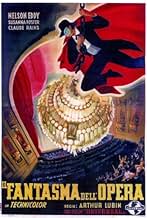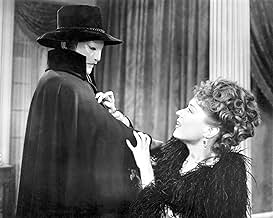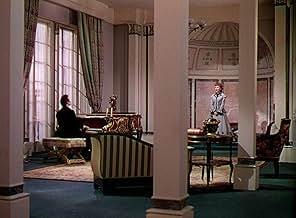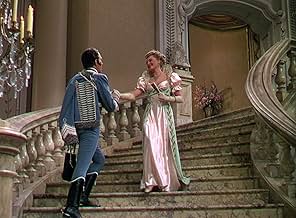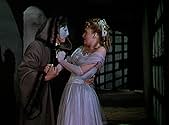Filme estrelado por Claude Rains como o mascarado fantasma da Ópera de Paris, um compositor enlouquecido que planeja fazer de uma linda jovem soprano a estrela da companhia de ópera e saciar... Ler tudoFilme estrelado por Claude Rains como o mascarado fantasma da Ópera de Paris, um compositor enlouquecido que planeja fazer de uma linda jovem soprano a estrela da companhia de ópera e saciar sua vingança contra os que roubaram sua música.Filme estrelado por Claude Rains como o mascarado fantasma da Ópera de Paris, um compositor enlouquecido que planeja fazer de uma linda jovem soprano a estrela da companhia de ópera e saciar sua vingança contra os que roubaram sua música.
- Direção
- Roteiristas
- Artistas
- Ganhou 2 Oscars
- 3 vitórias e 5 indicações no total
- Landlady
- (as Kate Lawson)
Avaliações em destaque
Gaston Laroux's Phantom of the Opera is one of those stories that filmmakers feel compelled to retell every couple of years, so there's not a great deal to set this apart from all those other versions. Universal's use of colour is uncharacteristically sumptuous, and given that this tale falls nominally into the horror category for which they were famed, it stands by comparison to their other output of the time as something of a prestige production. There's not really much horror to speak of – although, by modern standards, none of the 40s horror films are likely to scare anyone over the age of five, so it's not out of the ordinary there. In fact it would arguably be more accurate to describe it as a musical given the amount of time that's given over to opera numbers that do little other than pause the action.
Claude Rains gives a typically polished performance as the tormented Claudin, although the failure of the script to get under his character's (scorched) skin once he assumes the identity of the Phantom leaves the actor with little to work with once he dons the mask and descends into B-movie madness. Nobody else in the cast really stands out. Susanna Foster makes a rather unmemorable ingénue (who shows worrying indications of following the same path as the prima donna she replaces given the way some of their lines are nearly identical), and leaves you wondering why poor old Claudin got so hot and bothered over her in the first place. Nelson Eddy and Edgar Barrier provide some light relief as the troupe's baritone and the investigating police officer, both of whom also fall under Miss Foster's mysterious spell.
Phantom of the Opera provides a good example of 40s Hollywood expertise (although it looks more like an MGM film than a Universal), and is entertaining enough even though it rarely provides anything that's likely to stick in the mind. Arthur Lubin at least attempts moments of artistry – for example by having the camera repeatedly passing sources of light – candelabras, chandeliers, etc – to suggest the fatal fascination Claudin's object of unrequited love holds for him.
Although several proposals were considered (including one intended to feature Deanna Durbin, who despised the idea and derailed the project with a flat refusal), it wasn't until 1943 that a remake reached the screen. And when it did, it was an eye-popping Technicolor extravaganza, all talking, all singing, and dancing. The Phantom had gone musical.
In many respects this version of PHANTOM anticipates the popular Andrew Lloyd Webber stage musical, for whereas the Chaney version presented the Phantom as a truly sinister entity, this adaptation presents the character as one more sinned against than sinning--an idea that would color almost every later adaptation, and Webber's most particularly so. But it also shifts the focus of the story away from the title character, who is here really more of a supporting character than anything else. The focus is on Paris Opera star Christine Dae, played by Susanna Foster. In this version Christine is not only adored by the Phantom; she is also romantically pursued by two suitors who put aside their differences to protect her.
Directed by Universal workhorse Arthur Lubin, this version is truly eye-popping as only a 1940s Technicolor spectacular could be: the color is intensely brilliant, and Lubin makes the most of it by focusing most of his camera-time on the stage of the Paris Opera itself and splashing one operatic performance after another throughout the film. But in terms of actual story interest, the film is only so-so. Susanna Foster had a great singing voice, but she did not have a memorable screen presence, and while the supporting cast (which includes Nelson Eddy, Edgar Barrier, Leo Carrillo, and Jane Farrar) is solid enough they lack excitement. And the pace of the film often seems a bit slow, sometimes to the point of clunkiness.
The saving grace of the film--in addition to the aforementioned photography, which won an Oscar--is Claude Rains. A great artist, Rains did not make the mistake of copying Chaney, and although the script robs the Phantom of his most fearsome aspects, Rains fills the role with subtle menace that is wonderful to behold, completely transcending the film's slow pace, the lackluster script, and "sanitized for your protection" tone so typical of Universal Studios in the 1940s. Unless you're a die-hard Phantom fan you're likely to be unimpressed.
Gary F. Taylor, aka GFT, Amazon Reviewer
A task rendered considerably easier by the presence of Nelson Eddy and Susanne Foster. Unlike his screen partner at MGM, Jeanette MacDonald, Nelson Eddy came from the opera to the cinema. He always viewed himself as a singer first, films were something he did to get publicity for his concert tours. But Eddy always loved the grand opera, it could easily been his career path. Consequently The Phantom of the Opera and the arias he sings here always had a special place in his affections. We see a lot of the real Nelson here.
Another one of his interests was sculpture. The bust of Susanna Foster that Claude Rains stole from Eddy's dressing room is something that Nelson Eddy actually did. Sculpting was a hobby of his and as you can see he was quite good at it. Might have made a living doing that as well.
Susanna Foster who had a lovely soprano voice gave up her career soon after this most acclaimed of her films. A pity too, it was a real loss to the screen.
This Phantom of the Opera has a bit of comedy in it as well. Baritone Nelson Eddy and Inspector of the Surete Edgar Barrier have an uneasy rivalry going for the affections of Foster. The scenes involving this are nicely staged by director Arthur Lubin, more known for doing Abbott and Costello comedies.
This may have been Edgar Barrier's best film role. He was a more than competent player, his career probably suffering because he was a bit too much like Warren William who was himself a poor man's John Barrymore. Barrier played equally well as villains or as a good guy as he is here. Another fine role for him even though he only has one scene is in Cyrano de Bergerac where he plays the very sly and all knowing and discerning Cardinal Richelieu.
Of course Phantom of the Opera is really made by the performance of Claude Rains as the mild mannered, inoffensive Eric Claudin, a violinist in the Paris Opera who is crushing out big time on Susanna Foster. We see him first being told after 20 years he's being given the sack by the company. What they describe sounds an awful lot like Carpel Tunnel Syndrome that he's developed which is affecting his playing the violin. Bad news for Susanna Foster also because he's been her secret benefactor in paying for voice lessons.
There isn't any middle aged man who doesn't identify with Rains. Tossed out of his job, the rent due, crushing out big time on a young girl, a lot of us have been there. Then when he thinks an unscrupulous music publisher is stealing a concerto he's written, he loses it completely and kills him. And when acid is thrown in his face disfiguring him, it's a short journey to madness.
Rains really makes us feel for Claudin. In that sense the film is not a horror picture in that we're dealing with monsters or unworldly creatures that Universal so specialized in. The man who becomes the Phantom is all too real, too human, and if we're pushed right, could be any one of us.
Can you do better than opera arias by Nelson Eddy and a classic performance by Claude Rains? I think not.
Você sabia?
- CuriosidadesThe original script revealed Claudin to be Christine's father, who abandoned her and her mother in order to pursue a musical career. When this was excised from the final film, it left Claudin's obsession with Christine unexplained.
- Erros de gravaçãoWhen Christine takes the mask off from Phantom's face, we see that his scar reaches the low area of his right cheek, even the right eyelid is slightly fallen. But before that during the entire film, we never see a single mark of the scar on the uncovered area of the Phantom's face, not even the fallen eyelid through the mask.
- Citações
[Christine has left Raoul and Anatole in her dressing room while she greets a crowd of admirers]
Raoul D'Aubert: Would you join me for a bit of supper at the Cafe de l'Opera?
Anatole Garron: With pleasure, monsieur.
Raoul D'Aubert: Think we can get through this crowd?
Anatole Garron: Certainly. After all, who'd pay any attention to a baritone and a detective?
- ConexõesFeatured in Weirdo with Wadman: Phantom of the Opera (1964)
- Trilhas sonorasLULLABY OF THE BELLS
(uncredited)
Written by Edward Ward
Lyrics George Waggner
Sung by Susanna Foster and Nelson Eddy
Principais escolhas
- How long is Phantom of the Opera?Fornecido pela Alexa
Detalhes
- Data de lançamento
- País de origem
- Idioma
- Também conhecido como
- El fantasma de la ópera
- Locações de filme
- Empresa de produção
- Consulte mais créditos da empresa na IMDbPro
Bilheteria
- Orçamento
- US$ 1.500.000 (estimativa)
- Tempo de duração1 hora 32 minutos
- Mixagem de som
- Proporção
- 1.37 : 1
Contribua para esta página




